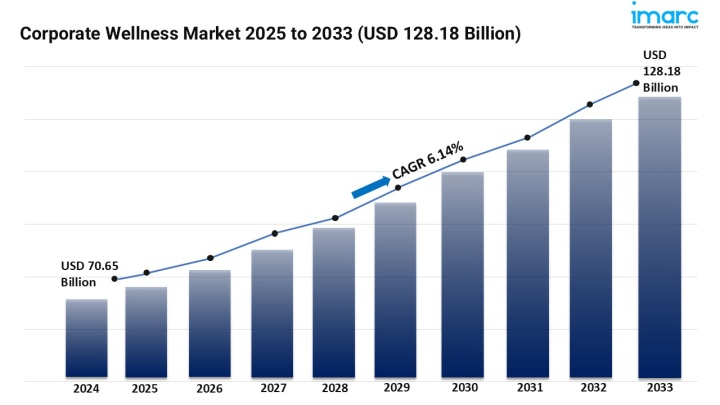

Market Overview:
The corporate wellness market is experiencing rapid growth, driven by Rising Workplace Stress and Mental Health Concerns, Increasing Employer Focus on Productivity and Retention and Government Support and Wellness Policy Integration. According to IMARC Group's latest research publication, "Corporate Wellness Market :Global Industry Trends, Share, Size, Growth, Opportunity and Forecast 2025-2033", The global corporate wellness market size was valued at USD 70.65 Billion in 2024. Looking forward, IMARC Group estimates the market to reach USD 128.18 Billion by 2033, exhibiting a CAGR of 6.14% during 2025-2033.
This detailed analysis primarily encompasses industry size, business trends, market share, key growth factors, and regional forecasts. The report offers a comprehensive overview and integrates research findings, market assessments, and data from different sources. It also includes pivotal market dynamics like drivers and challenges, while also highlighting growth opportunities, financial insights, technological improvements, emerging trends, and innovations. Besides this, the report provides regional market evaluation, along with a competitive landscape analysis.
Download a sample PDF of this report: https://www.imarcgroup.com/corporate-wellness-market/requestsample
Our report includes:
Growth Factors in the Corporate Wellness Industry:
Workplace stress and burnout are increasingly shaping employee well-being and organizational performance. Long working hours, digital overload, and job insecurity are creating mental health challenges across industries. Employers are responding by offering mindfulness apps, confidential counseling services, and resilience workshops to reduce stress levels. Global companies like Google and Accenture are investing in mental health platforms that provide continuous support for employees. Many organizations are also adding wellness days and peer support groups to normalize conversations around mental well-being. With rising awareness, emotional health is becoming a business priority, reshaping wellness strategies and driving demand for corporate well-being programs.
Employers now see corporate wellness as essential for boosting productivity and retaining skilled talent. Healthier employees translate into fewer absences, stronger morale, and more consistent output. Organizations are investing in gamified fitness challenges, nutrition programs, and employee coaching to encourage lasting lifestyle improvements. Tech-driven wellness ecosystems are growing, with companies like Salesforce offering on-site gyms alongside digital health apps. To retain talent, firms are experimenting with wellness-linked rewards, flexible work models, and subsidized health memberships. As competition intensifies, these programs are no longer perks but strategic retention tools, helping organizations strengthen loyalty and build a resilient, engaged workforce.
Governments are increasingly encouraging workplace wellness adoption as part of public health agendas. Policies aimed at reducing lifestyle-related diseases are being aligned with corporate wellness initiatives. For example, India’s National Wellness Programs incentivize companies to introduce preventive health activities, while the UK promotes tax relief for approved wellness benefits. Insurance providers are also working with policymakers to lower premiums for companies offering structured health programs. This alignment between government, insurers, and businesses makes wellness initiatives more accessible, particularly for small and mid-sized firms. Strong regulatory support is accelerating industry adoption and embedding wellness into organizational cultures globally.
Key Trends in the Corporate Wellness Market
The corporate wellness industry is rapidly moving toward data-driven personalization. AI-powered platforms analyze biometric data, wearable device inputs, and lifestyle habits to deliver tailored health recommendations. Companies such as Virgin Pulse and Fitbit Health Solutions are designing programs that adapt to individual employee needs, from custom fitness plans to stress management tips. Employers benefit by tracking engagement levels and health improvements in real time, ensuring measurable returns on investment. Personalized wellness encourages higher participation because employees feel supported with solutions that match their goals. This focus on customization is redefining how organizations engage workers in long-term wellness.
The shift to hybrid and remote work is driving adoption of digital-first wellness platforms. Organizations are leveraging virtual health consultations, meditation apps, and AI-powered well-being assistants to support dispersed teams. Platforms like BetterUp and Headspace for Work are offering employees round-the-clock access to resources, regardless of location. Integration with workplace tools such as Microsoft Teams and Slack makes participation seamless. These remote-friendly solutions ensure that health support reaches employees at home, on the go, or in the office. By breaking geographical barriers, virtual wellness has become a core pillar of inclusive employee well-being strategies in the post-pandemic workplace.
Corporate wellness is broadening beyond fitness and nutrition to address multiple dimensions of well-being. Employers are introducing initiatives that cover emotional resilience, social inclusion, financial planning, and career growth. For instance, Deloitte and PwC are designing wellness frameworks that combine professional development with mindfulness and family support. Community-building activities, diversity programs, and mental health awareness campaigns are also gaining traction. This holistic approach acknowledges that employee well-being extends beyond physical health, shaping a more inclusive work culture. Companies that adopt multidimensional strategies are better positioned to strengthen engagement, improve retention, and create long-term value through healthier, more balanced workforces.
The Corporate Wellness Market report provides a comprehensive overview of the industry. This analysis is essential for stakeholders aiming to navigate the complexities of the Corporate Wellness Market and capitalize on emerging opportunities.
Leading Companies Operating in the Corporate Wellness Industry:
Corporate Wellness Market Report Segmentation:
By Service:
Health risk assessment represented the largest segment due to the increasing demand for effective wellness solutions.
By Category:
Organizations/employers accounted for the largest market share on account of the rising prevalence of chronic diseases and mental health issues among employees.
By Delivery:
Onsite holds the biggest market share as they provide easy and immediate access to wellness resources among employees.
By Organization Size:
Large scale organizations exhibit a clear dominance in the market on account of the increasing focus on workplace wellness.
Regional Insights:
North America enjoys the leading position in the corporate wellness market due to favorable government initiatives.
Note: If you require specific details, data, or insights that are not currently included in the scope of this report, we are happy to accommodate your request. As part of our customization service, we will gather and provide the additional information you need, tailored to your specific requirements. Please let us know your exact needs, and we will ensure the report is updated accordingly to meet your expectations.
About Us:
IMARC Group is a global management consulting firm that helps the world’s most ambitious changemakers to create a lasting impact. The company provide a comprehensive suite of market entry and expansion services. IMARC offerings include thorough market assessment, feasibility studies, company incorporation assistance, factory setup support, regulatory approvals and licensing navigation, branding, marketing and sales strategies, competitive landscape and benchmarking analyses, pricing and cost research, and procurement research.
Contact Us:
IMARC Group
134 N 4th St. Brooklyn, NY 11249, USA
Email: sales@imarcgroup.com
Tel No:(D) +91 120 433 0800
United States: +1–201971–6302
